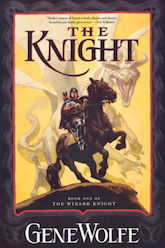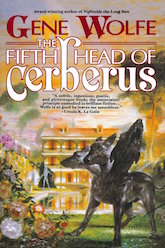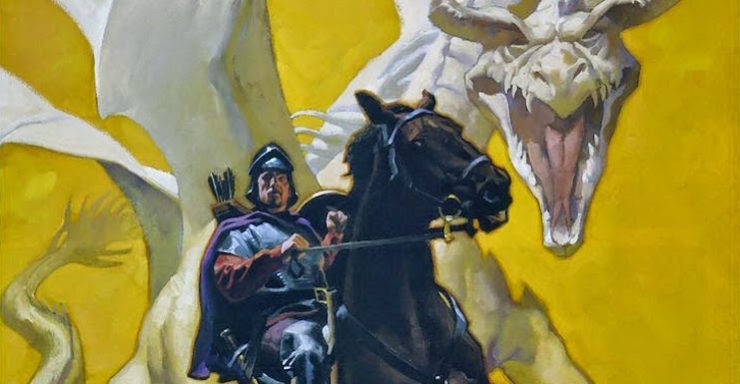The King of Hearts, not the wisest of monarchs, gives this advice on reading in Alice’s Adventures in Wonderland: “Begin at the beginning […] and go on till you come to the end: then stop.” That advice has never served Lewis Carroll’s readers, who delight in re-reading the Alice books and solving their puzzles, and it serves just as poorly for Gene Wolfe’s readers, many of whom don’t count a Wolfe book as read until it’s been re-read.
Still, whatever failings the King of Hearts might have had, there’s something to be said for beginning at the beginning, and so here follows my examination of Gene Wolfe’s opening sentences.
Buy the Book


The Knight: Book One of The Wizard Knight
Going on until you come to the end is one thing, but even beginning at the beginning can be difficult with Wolfe. Science fiction and fantasy have reputations for being self-referential; think, for example, of George R.R. Martin’s radical revision of epic fantasy, or of the summary dismissal of past utopias in William Gibson’s “The Gernsback Continuum.” Wolfe knows the genre—he’s been reading it since the forties and writing it since the sixties—and he happily admits the influence of, for example, Jack Vance’s Dying Earth books on his own New Sun sequence.
A knowledge of SFF, even one as deep as Wolfe’s, is rare but not unexpected; I’m not sure that it’s as fundamental to Wolfe’s success as his broad knowledge of literature in general. He shares with his sometime collaborator Neil Gaiman an appreciation of early twentieth-century titans like Chesterton and Kipling; he’s also an enthusiastic reader of Nabokov, Proust, and quintessential postmodernist Robert Coover. The opening line of The Fifth Head of Cerberus, “When I was a boy my brother David and I had to go to bed early whether we were sleepy or not,” is a riff on Proust’s “For a long time I went to bed early.” Readers unfamiliar with Swann’s Way will enjoy and understand the story, while people who recognize the source quote will be unsurprised to find that The Fifth Head of Cerberus proves to be a story of reminiscence and the decipherment of society. There’s also, perhaps, a slight clue to the story in the sentence’s grammar: If the narrator had only one brother, we would read “my brother, David” rather than the comma-less “my brother David.” We eventually do learn why that comma is missing.
Although I’ve limited myself to Wolfe’s opening sentences for the purposes of this article, he never exhausts his effects on the first page. To pick an example at random: a single sentence in the first person near the very end of a book otherwise in the third person asks readers to reconsider everything that they’ve already read. Learning that the narrator is a participant in the tale, albeit a relatively insignificant one, both explains a lot and raises a whole series of new questions.
Buy the Book


The Fifth Head of Cerberus
I’ve talked about three of Wolfe’s opening sentences here; if you consider the novels alone and disregard the hundred-plus short stories, there are still more than thirty openings to consider. Wolfe is prolific, and more than one friend has asked me where to start reading him. I maintain that The Book of the New Sun remains the best place to start with Wolfe, since I believe it’s both his masterpiece and a pinnacle of the genre. It’s a strange and paradoxical book: a ruminative picaresque, a dirge of rebirth, set in a world that’s equally of the future and of the past. It’s also a thousand pages and four books long, so you may want to start elsewhere.
Readers who, King of Hearts-like, want to begin at the beginning of Wolfe’s career should ignore his first novel, Operation ARES, disowned long ago and for decades absent even from the “Also by Gene Wolfe” page at the front of his books, and instead read his second, the much-superior The Fifth Head of Cerberus, which is perhaps the best one-book introduction to his work. Wolfe has many standalone titles, but some of his mid-career books, like Castleview and Pandora by Holly Hollander, are very atypical, and some of his later books, straightforward and even terse as they may seem, are among the most oblique and complicated of his career, and as such not the best place to start. Pirate Freedom is a relatively recent book and a comparatively straightforward one; I wouldn’t rank it as his best, though it’s among his most accessible and includes, should you ever need them, useful pointers on surviving a knife fight. The Devil in a Forest is another comparatively simple book, about growing up and the glamor of evil. Peace is a short and apparently realistic novel; it’s one of Wolfe’s best, though very quiet and subtle, and would be my immediate recommendation for someone who doesn’t read much genre fiction.
In any case: Begin at the beginning and go on till you come to the end: then start again, or start another.
Matt Keeley reads too much and watches too many movies; he is helped in the former by his day job in the publishing industry. You can find him on Twitter at @mattkeeley.











I start reading Gene Wolfe with a dictionary at my side.
I started reading The Knight after hearing such great things about Gene Wofe. I made it about halfway through and couldn’t believe how bad the book was. It was amateurishly bad. Never read anything else by him since then.
2, in the immortal words of Pee-Wee Herman, it’s quite possible that he meant to do that. Hard to say without you being specific, but that particular series was deliberately written in a way that could be interpreted as amateurish.
May be worth trying something else of Wolfe’s.
austin, a meta-almost spoiler follows: the events in The Knight are highly metaphorical. So metaphorical just about everyone can read it a few times and still miss it. Able chases a huge spikey cloud in the sky, winds up in a wet cave told to wait for the slack of the tide, is told to plant a seed, says he is “all mixed up” with some girl whom he seeks, and is given a string which connects him to the dreams and voices of our Earth … every scene is almost equally biologically metaphorical. Wolfe is doing a lot of things in that book that most readers simply aren’t used to looking for.
“It was amateurishly bad.”
And who would you say is really good in the genre? If you find Wolfe so bad, I would love to know.
I think if you like novels, Book of the New Sun is the best option. but if novels don’t obsess you, go for a collection of short stories, of which Wolfe has written many.
The problem with most of the longer works is that you need to be well-read in SF to appreciate them. This applies to Fifth Head of Cerberus more than to Book of the New Sun, because the latter is longer and can explain its world better.
If you don’t care about SF, the standalone Peace – a ghost story of sorts – may be a good choice. It’s one of Wolfe’s best, no less complex than the others, but the reader doesn’t need so much in the way of prior education.
As for the Wizard Knight, whatever Wolfe was doing with it (and I don’t think anyone is entirely sure) can certainly be mistaken for being bad! So leave that one until you are sure you are willing to give Wolfe the benefit of the doubt!
First…not everyone can wrap their heads around Gene Wolfe. So cut them some slack and don’t challenge them.
I am actually reluctant to recommend Gene to my friends because what if they don’t enjoy it or never even consider that second read. I can stand on a chair and push, but I can’t force them to appreciate something with which they can not connect.
I liked this article very much. This is good and important stuff. I would love to see more in-depth analysis of Gene Wolfe’s work. Please?
Nice to see Peace and The Devil in a Forest given some love. They’re two favorites, more so than later standalones like Castleview. While I had long loved Wolfe by the time The Knight came out, I did struggle with Wizard/Knight. I finished the duopoly but felt rather dissatisfied. I already knew that unreliable narrator was a favorite Wolfe device, and it’s also a favorite of mine as a reader. But it just didn’t work for me there, more so with The Wizard which was even harder to finish than its predecessor. I should probably reread them since I must have missed something. My intro to his work was the wonderful Fifth Head, and I picked up each volume of New Sun (and of Long and Short) as it came out. I’m also quite fond of the Latro sequence.
Ha! The two things I remember from Pirate Freedom are the knife fight advice and the last line! The Wolfe Archipelago isn’t a bad place to start either…
I thoroughly enjoyed the book of the new sun–densely allusive, with language so intriguingly archaic yet perhaps original. Fuliginous alzabos and destriers, oh my! And I’m sure there were layers of references to the Kabbalah and the sephiroth, as well as both obvious and non-obvious Christian imagery which escaped me. I recall looking up the name Thecla and finding that she was an early Christian saint (perhaps? It’s been a decade at least). And the plot had predestination paradoxes and causality violations galore, my favorite sort of thing.
And yet, despite that great store of interest in Wolfe engendered by the saga of Severian, I abandoned the wizard knight series halfway through. The surface level narrative hooks which invite the reader to consider deeper structures within just weren’t present from my perspective. I didn’t care about the protagonist and his fate or the mysteries of his universe. THis despite a great fondness for Norse myth. Ah well, perhaps I’ll give it another shot in a decade.
Derek
My favorite thing about Book of the New Sun is that few (none?) of the odd words are made up from whole cloth — they’re all some combination of incredibly obscure or derived from Latin or some other foreign language.
I’m a long time Gene Wolfe fan, introduced to him through a short story, “Seven American Nights.” That’s a great place to begin. I was instantly hooked and knew this was an SF craft-master. *The Knight *has to be taken with a large grain of salt, and I prefer other works by him, but I still own copies. Not everything of his can appeal to everyone, and if you don’t like that particular work, another one will likely capture you. He’s no easy read, so if you’re looking for other stuff, I’d recommend his *Soldier* series: Soldier of the Mist, S of Arete, S of Sidon. They’re more straightforward—but beware, for Wolfe can get complex. Do read *Fifth Head of Cerberus.* I like the Short Sun and Long Sun books, but they may not be your cuppa. Hope you can find a good read from a major fave.
11, I think of it as a Reverse (or inverse) Tolkien. Instead of making up a language, he took a language and made up the words.
I actually think some of his short stories are a great place to start. Seven American Nights is great , or my favourite: The Island of Doctor Death and Other Stories.
You can listen to The Island of Doctor Death and Other Stories on Podcastle, and it’s well read.
Austin, you posted the exact same thing on the last Wolfe article back on Oct 16. What exactly are you trying to prove by repeatedly pissing in the pool?
Here’s an idea: either read something that is considered one of his best, or stop reading articles about him. Go outside, take a walk. Be happy. Life is too short to just swoop in to post the same review over and over.
Seriously, read Shadow of the Torturer (the best) or let it go. Peace.
I believed for a while that Book of the New Sun was my introduction to Wolfe until I recovered the books I’d left behind when I moved away from my parents and noticed the author on my copy of There Are Doors. It turned out I’d been a fan for longer than I knew.
Incidentally, There Are Doors is very good and very Wolfe.
There Are Doors is also a very good book to start with.
Another one that can be a good place to start is The Sorcerer’s House. It’s interesting and very characteristically Wolfe, but the Wolfean features are a little more obvious and easier to unpack. I won’t say more lest I spoil it in some way.
This is about as good of an introduction to first-time readers of Gene Wolfe that I have read. Bravo, Mr. Keeley. I look forward to reading more of your articles, especially those regarding Mr. Wolfe’s writings.
One minor correction – The Book of the New Sun is actually a five book sequence, completed by The Urth of the New Sun – admittedly, it was added some time after the first four. It is linked with the Long Sun and Short Sun sequence in a rather complex way – making a Solar Cycle of 12 books in all.
I’d suggest that the best way to start with Wolfe is at the end. ‘A Borrowed Man’ has most of his themes laid bare for the novice reader in a simple-to follow story with complex aftershocks. If this is his farewell novel it’s typically generous that he offers a nursery slope for his earlier works and – as with ‘A Solar Labyrinth’ – allegorises the ground-rules of his fiction.
Austin, et. al – I had read several of Wolfe’s books prior to reading The Knight / Wizard, and maybe that set me up to know what to expect. Those two books are some of my favorites of his novels. Like other works of his, The Knight simultaneously subverts and expands the fantasy genre, and that to me is one of the most delightful aspects of his writing. I’ve never read any other books that had such a dream-like quality – sometimes after reading a chapter or two, I felt less like I’d read a book, and more like I’d had a dream. I can’t say that’s ever happened to me before. There’s a strange vagueness that weaves itself into the story like a fog, and makes you constant question what is actually happening, or if certain things are even happening at all. They are really weird, but that’s precisely why they’re so great – they stand completely apart from anything else in the swords-knights-elves-quests-dragons world. I’ve read so many fantasy novels that were formulaic and tired, and that made these two books a welcome breath of fresh air.